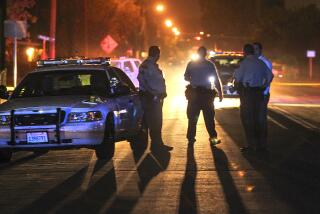Editorial:: Bills seeking to firm up California’s red-flag gun law offer a mixed-bag
- Share via
Three years ago, California became the first state to give immediate family members of mentally unstable people the ability to obtain a court order temporarily barring the ailing person from possessing firearms. The genesis of that measure was the May 2014 tragedy at Isla Vista, in which 22-year-old Elliot Rodger stabbed and shot to death six UC Santa Barbara students before killing himself. A month earlier, Rodger’s parents had discovered troubling videos he’d posted on YouTube and called police, but the officers who responded found insufficient cause to intervene.
The new law allowed a judge, at the request of a mentally troubled person’s close relatives or law enforcement officers, to order firearms be removed immediately. The judge would then hold a hearing within 21 days to give the subject an opportunity to prove the order was unnecessary or, conversely, to extend the firearm ban for up to a year. It was a smart law that has become the template for similar state “red flag” laws around the nation.
Several bills now before the Legislature in Sacramento aim to improve on that law. They are part of a continuing drive among state legislators to enact meaningful reforms to limit access to firearms for people who shouldn’t have them, and to protect all Californians from gun violence. It’s a shame that Congress, under the sway of the National Rifle Association and the gun lobby it represents, has been incapable of adopting meaningful gun control laws to provide the nation with the kind of broad, sensible protections it needs, such as severely restricting access to firearms designed for combat and requiring background checks for all firearms transactions. But at least California has been trying, and we live under some of the toughest gun laws in the nation.
Enter the Fray: First takes on the news of the minute »
But the laws, of course, can be made better, and two bills introduced by Assemblywoman Jacqui Irwin (D-Thousand Oaks), Assembly Bill 12 and AB 339, would fine-tune the red-flag statute. AB 339 would require law-enforcement agencies to standardize policies and training on how officers deliver restraining orders and confiscate firearms, focusing on public safety — seizing guns from a mentally unstable person can be dangerous — and protecting the constitutional rights of the subject of the order. AB 12 would clarify and streamline how police relieve subjects of their weapons and expand, at a judge’s discretion, the duration of the order from one year to a maximum of five years. At first blush that seems like a long time, but the bill would allow the subject to ask the court annually to lift the order, which seems sufficient to protect due process.
A third bill, AB 61 from Assemblyman Phil Ting ( D-San Francisco), is more problematic. The measure would expand the pool of people who can request a gun violence restraining order to include employers, co-workers “if they have had substantial and regular interactions with the subject for at least one year and have obtained the approval of the employer,” and staffers at high schools or post-secondary schools if they “have obtained the approval of the school administration staff.” That moves the existing, reasonable state law onto shakier ground.
Police presumably have sufficient expertise to determine that someone poses a risk to himself or others, and to ask a judge to order a person to relinquish his firearms pending a fuller hearing. Similarly, family members should be able to flag to the courts that a loved one has become too unstable to own firearms and poses a danger to himself and others. But expanding that power to co-workers or school officials who have a more distant connection to the person and much more limited experience with potentially dangerous individuals goes too far.
Yes, bosses, colleagues and school staff might be in a position to notice a brewing problem, but they also can easily call the police to step in and determine whether seeking a restraining order would be prudent. That seems sufficient to protect public safety while preserving the civil liberties of the person under question.
Follow the Opinion section on Twitter @latimesopinion or Facebook
More to Read
A cure for the common opinion
Get thought-provoking perspectives with our weekly newsletter.
You may occasionally receive promotional content from the Los Angeles Times.










